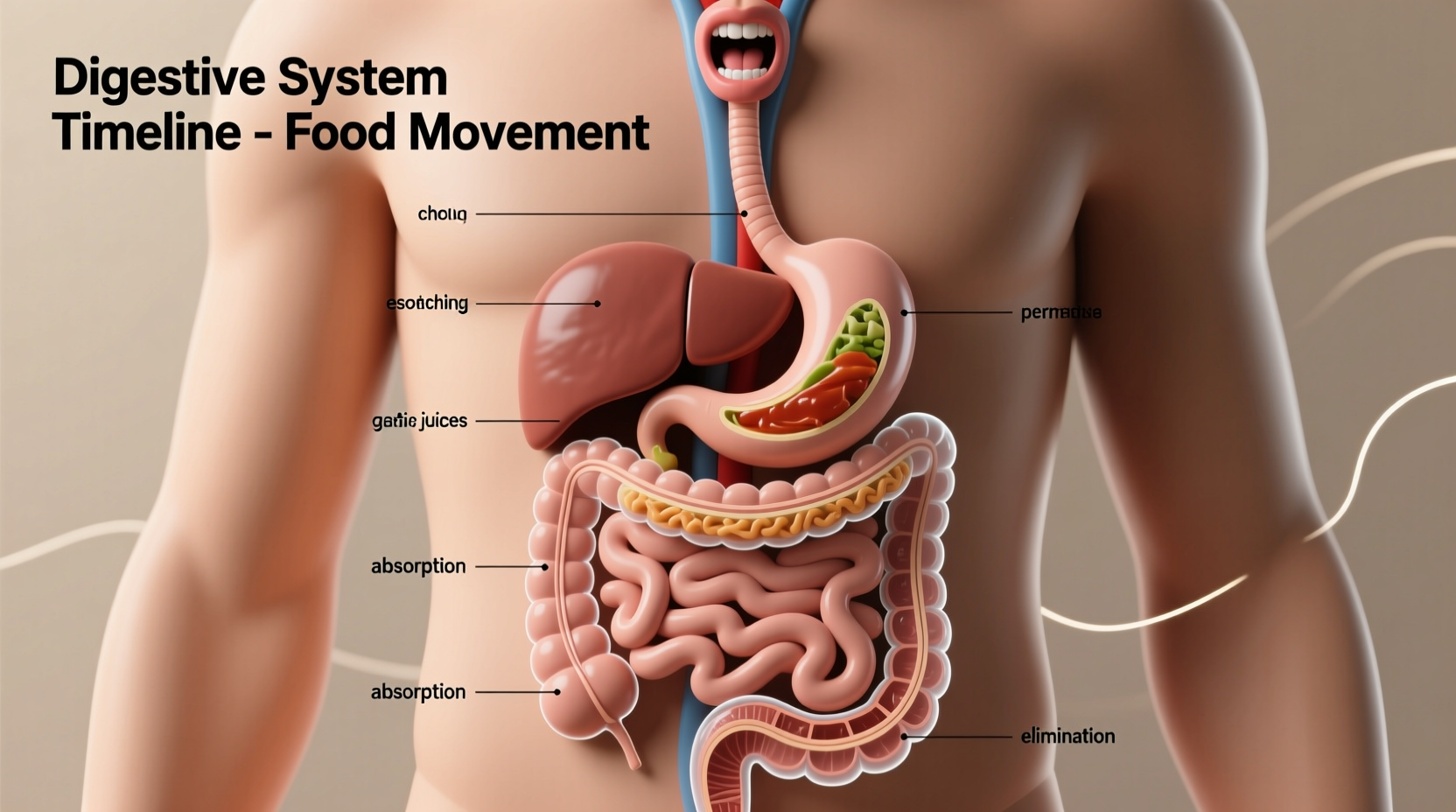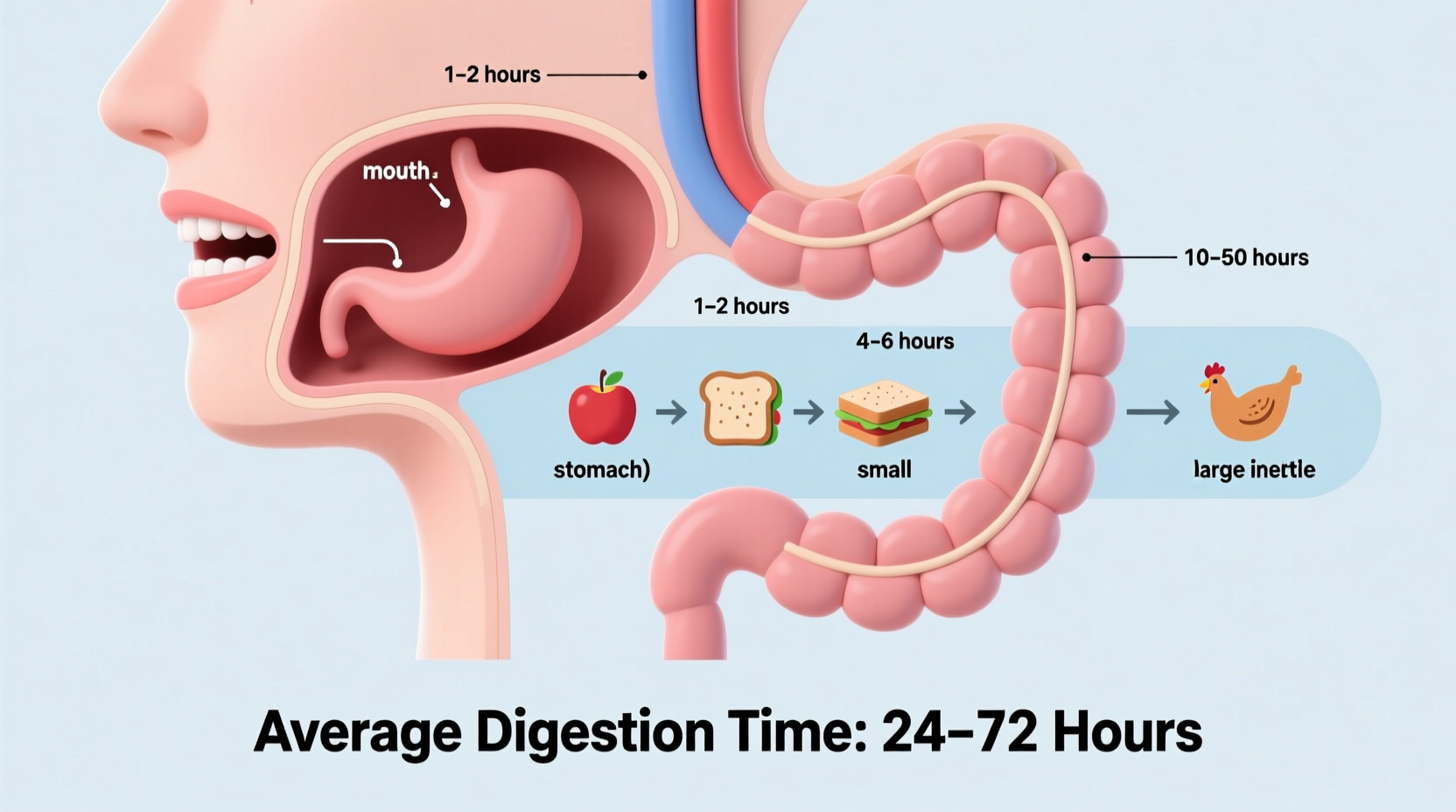The Complete Digestion Timeline: From First Bite to Final Exit
Understanding how long food takes to digest isn't just curiosity—it affects everything from meal timing to energy levels and gut health. Let's break down the actual journey your food takes through your digestive system.
Digestion Stage-by-Stage Breakdown
Your digestive system works like a carefully coordinated assembly line, with each section performing specific functions at different speeds. Here's what happens at each stop:
| Digestive Stage | Typical Duration | Key Processes |
|---|---|---|
| Mouth & Esophagus | 5-15 seconds | Mechanical breakdown, initial starch digestion |
| Stomach | 2-5 hours | Protein breakdown, acid mixing, churning |
| Small Intestine | 2-6 hours | Nutrient absorption, bile & enzyme action |
| Large Intestine | 10-59 hours | Water absorption, bacterial fermentation |
| Total Transit Time | 24-72 hours | Complete digestion to elimination |
Why Digestion Time Varies: The Critical Factors
That "24-72 hour" range isn't arbitrary—it reflects how dramatically individual factors affect digestion speed. According to research from the National Institute of Diabetes and Digestive and Kidney Diseases, these elements significantly alter your personal digestion timeline:
Food Composition Matters Most
- Fat-rich foods (avocado, nuts, fried items): Slow gastric emptying by 30-50% compared to low-fat meals
- High-fiber foods (whole grains, vegetables): Increase transit time through the colon by promoting bulkier stool formation
- Protein-heavy meals (meat, dairy): Require more stomach acid and enzymes, extending stomach processing time
- Simple carbohydrates (sugary foods, white bread): Move fastest through initial digestion stages but can cause later fermentation issues

Individual Factors That Accelerate or Delay Digestion
Your personal biology creates unique digestion patterns. A Mayo Clinic study tracking gastrointestinal motility found these consistent patterns:
- Age differences: Digestion slows approximately 5% per decade after age 40 due to reduced muscle tone and enzyme production
- Gender variation: Women typically experience 20-30% longer colonic transit times than men, particularly during certain menstrual phases
- Metabolic conditions: Diabetes can double gastric emptying time in cases of gastroparesis
- Physical activity level: Moderate exercise after meals can reduce total transit time by 15-20% through increased peristalsis
When Digestion Times Signal Health Concerns
While variation is normal, extreme deviations from typical digestion patterns may indicate underlying issues. The American Gastroenterological Association identifies these red flags:
- Consistently under 24 hours: Could indicate malabsorption, infection, or inflammatory bowel disease
- Regularly over 72 hours: May signal constipation disorders, hypothyroidism, or neurological issues affecting gut motility
- Sudden changes in your normal pattern without dietary explanation warrant medical consultation
Practical Strategies to Support Healthy Digestion
Instead of chasing "faster" digestion—which isn't always better—you'll benefit more from supporting optimal digestive function. Based on clinical nutrition research, these evidence-based approaches work:
- Strategic food combining: Pair proteins with non-starchy vegetables rather than heavy carbohydrates to prevent digestive overload
- Hydration timing: Drink water 30 minutes before meals rather than during to avoid diluting stomach acid
- Mindful eating practice: Chew each bite 20-30 times to reduce stomach workload by up to 30%
- Post-meal movement: Gentle 10-minute walks after eating can improve gastric emptying rates by 13% according to NIH research
Common Digestion Myths Debunked
Many popular digestion "hacks" lack scientific backing. Let's clarify what actually works:
- Myth: "Drinking water during meals dilutes stomach acid and impairs digestion" Fact: Moderate fluid intake with meals doesn't affect pH levels significantly—only excessive amounts (more than 500ml) may slightly delay gastric emptying
- Myth: "All fiber speeds up digestion" Fact: Soluble fiber (oats, apples) slows gastric emptying while insoluble fiber (wheat bran, vegetables) accelerates colonic transit
- Myth: "Digestion stops completely during sleep" Fact: While slowed by 20-30%, digestive processes continue throughout sleep—your body processes approximately 1/3 of daily digestion overnight
When to Consult a Healthcare Professional
Track your digestion patterns for two weeks using a simple food and symptom journal. Seek medical advice if you notice:
- Consistent bloating lasting more than 2 hours after meals
- Stool changes persisting beyond 3 days (floating, unusually pale, or extremely foul-smelling)
- Pain that consistently follows specific food types
- Unexplained weight changes alongside digestion issues











 浙公网安备
33010002000092号
浙公网安备
33010002000092号 浙B2-20120091-4
浙B2-20120091-4